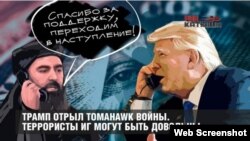In a dramatic shift of message, the current Russian propaganda campaign targets U.S. President Donald Trump. The mediametrics.ru Website shows, in the past week, the RIA-Novosti, Russia’s main government-owned news agency ran 104 articles related to Syria with “Trump” in the headline, compared to 21 with “Vladimir Putin.”
During and following the 2016 presidential campaign, Russian message-makers often depicted Trump as a friend of Russian President Vladimir Putin.
Kremlin’s media agency Sputnik tweeted on the eve of the Syria strikes, Trump was “not just a criminal for the whole world, he is Adolf Hitler number two,” quoting the Chairman of Russia’s Parliament Defense Committee, Alexander Sherin.
The Pentagon announced there was “a 2,000 percent increase in (output from) Russian trolls” in the 24 hours following the airstrikes by the U.S., Britain and France against Syria’s chemical weapons facilities.
Western experts say the purpose of Russian effort is to create doubt about the facts and sow political discord.
The main trends promoted by Russian media in the 48 hours since the strike on Syria include:
-The operation was a utter failure;
-Trump’s smart missiles cannot withstand Soviet-made air defense systems;
-The strikes violated international/U.S. laws;
-Missiles targeted and hit civilians;
-The U.S. carried out the attack to help Islamic State (IS) terrorists regroup;
-France cheated and did not launch any missiles
-Putin’s Russia remains the most powerful player in the Middle East
Fontanka.ru website published a photo-shopped poster depicting President Trump speaking over the phone with what appears to be the Islamic State leader Abu Bakr al Baghdadi (who Russia claims it killed in a strike a year ago). The caption reads “Trump opened the Tomahawk of war. IS terrorists shall be happy,” with “al-Baghdadi” telling the U.S. president, “Thanks for the support. Now we advance.”
The Atlantic Council’s Digital Forensic Research Lab (DFRLab) detailed competing official information emerging from defense officials of the coalition that stuck the Assad regime Saturday and the Russian Defense Ministry.
The coalition spokespeople described in detail the attack, the three targets and military assets contributed by each of the three countries. A Russian general claimed six airfields were also hit, which has not been verified by open source evidence.
“The contradictory claims painted a stark example of the potential for disinformation in an information vacuum, and the clash of narratives and information, which overlies the clash of arms,’ said the DFR Lab.
RIA-Novosti, Russia’s main government-owned news agency claimed that the Western media reported, “Russia has won without a single shot.”
The report quoted two articles: one by the Huffington Post and the other – the Reuters editorial. The Russian translation of both pieces is far from the original English texts, the conclusions reported by the Kremlin news agency vary widely from actual English words.
A caricature distributed in Russia’s most popular social network vKontakte says, “The U.S. launched 100 missiles in Syria, but did not hit anybody. Obviously, the rockets were toys.”
The government-owned Federal News Agency ran 25 Web pages on the strikes since Friday night. Last week the agency announced it is launching a new project called “Wake up America!” after Facebook banned its page.
Headlines read: “This was a fiasco, Trump!” “Only civilians suffered from the airstrikes in Syria: American missiles hit a school classroom.” “Syria –USA –71:32 – Score: Internet is laughing at the US failure of strike in Syria.”
“Time after time I fall for it. I tell people around me: no, it can't be that Russia is lying so blatantly,” Vienna-based media investor Christo Grozev tweeted. “There must be some partial truth in there. And time and again, it turns out: there's zero. Nada. Not a shred of truth.”
“Russia can lie and bluster all they want at UN and in the press, but that doesn’t change the scorched earth strategy they have supported against civilians in Syria – and elsewhere,” American information warfare expert Molly McKew wrote on Twitter.
A member of the U.S. Senate Armed Services Committee warned Americans the “fog of war” now includes Russia’s information battlefield.
“Americans need to understand that the wars of the future will look more like this: Russia is investing significant resources to create propaganda and disinformation,” Senator Ben Sasse of Nebraska said in a statement issued by his office.






